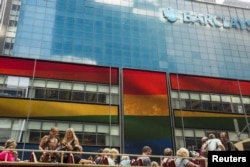When the World Bank exerts its influence for lesbian, gay, bisexual and transgender equality, businesses pay attention.
At the “Pride and Prejudice” summit in New York earlier this month, sponsored by the publishing organization The Economist Group, World Bank President Jim Yong Kim explained via teleconference that he would block loans to projects in developing countries that might compromise LGBT rights.
“If something that we support leads to not only discrimination but endangerment, don’t we as an institution have to stand up and say no?” Kim asked.
Kim has already established a record of action in fighting LGBT discrimination, including a 2014 decision to block funding to Uganda after it had passed a severe anti-homosexuality law.
Although social inclusion is hardly a novel concept within business-oriented circles, many are slow to catch on, particularly in more than 75 countries where it is still illegal to be gay — and where punishments range from fines to prison sentences to death.
Financial sense
For global businesses, the cost of not promoting inclusion is a matter not only of human rights but also financial sense.
The U.S. LGBT community has seen steady growth in economic influence, with combined purchasing power estimated by Witeck Communications to have risen from $790 billion in 2012 to $884 billion in 2014.
As global director of content strategy at The Economist Group, Mina Seetharaman said the LGBT community in the U.S. has made significant progress in recent years but is far from achieving full equality in the workplace.
“Yes, it is now legal in all 50 states for a gay couple or a lesbian couple to get married,” Seetharaman said. “However, they can get married on a Saturday and in 25 of those states be fired for being gay on Monday.”
Research conducted by The Economist’s Intelligence Unit shows 36 percent of global company leaders have reported “strong progress” on sexual orientation and gender identity diversity over the past five years. By comparison, 44 percent reported the same progress on ethnicity and racial diversity, and 54 percent on gender equality.
Seetharaman said both diversity fatigue and lack of “instinctive” awareness with regard to companies’ LGBT workforces help explain the lag in investment.
"It is pretty easy to see if someone is female or another race than you,” Seetharaman said. “But unless somebody self-identifies — and in many cultures it's uncomfortable to do that — you don't really have an idea of how much of your workforce is made up of people of that particular minority.”
The same study reports that a majority of companies surveyed believe talent management and employee satisfaction would be most positively affected by improved LGBT diversity.
Taking the lead
In the hospitality sector, Marriott International has taken the lead in creating an inclusive culture for its LGBT employees and guests. In 2014, it created the “Love Travels” diversity campaign, to make every guest “feel comfortable and welcome the moment they walk through our doors.” The Human Rights Campaign’s 2016 Corporate Equality Index awarded Marriott a perfect score.
Its chief executive, Arne Sorenson, said other companies that do not follow suit are at a loss.
“They are not going to get the same contribution out of members of that community if they work for them,” Sorenson said. “They're not going to get the same loyalty from guests who care about these issues, of which there are many, many, and more and more.”
Sorenson said Marriott’s operations in markets where gay and lesbian behavior is criminal focus less on changing local policy and more on protecting its staff. His goal, he said, is to make them feel “as empowered and productive in their careers with us and in their lives as they can be."
Worldwide momentum
Athlete Ally, a nonprofit organization, hopes to end homophobia and transphobia in sports through education and empowerment.
Its founder and chief executive, former NCAA All-American wrestler Hudson Taylor, said the fight against LGBT discrimination — in sports and elsewhere — is picking up momentum worldwide, particularly among younger generations who are often more willing to support organizations that share their value system.
“If teams, leagues, athletes and their sponsors are not being overtly supportive and inclusive and embracing of the LGBT community, and doing everything they can in their power to promote LGBT equality, then from a fan base standpoint, I'm not going to go to the championship,” Taylor said. “I think that's going to be the case more and more.”
As is the case in every major challenge, Taylor said, winning is never easy — especially in countries where achieving LGBT equality is hardest. But it’s a fight, he said, that will change — and perhaps save — lives, if everyone gets in the game.







